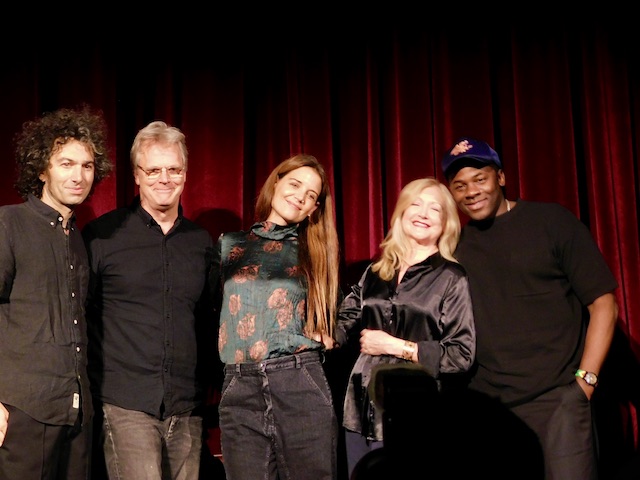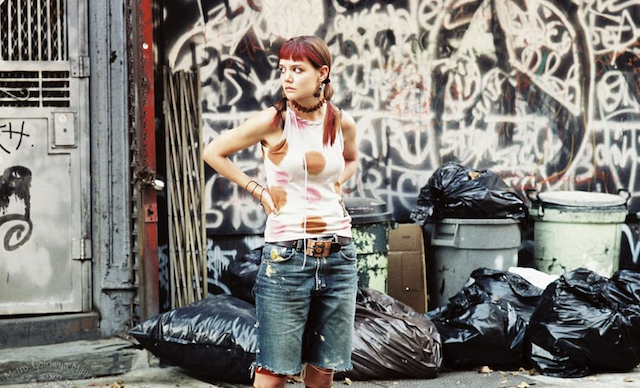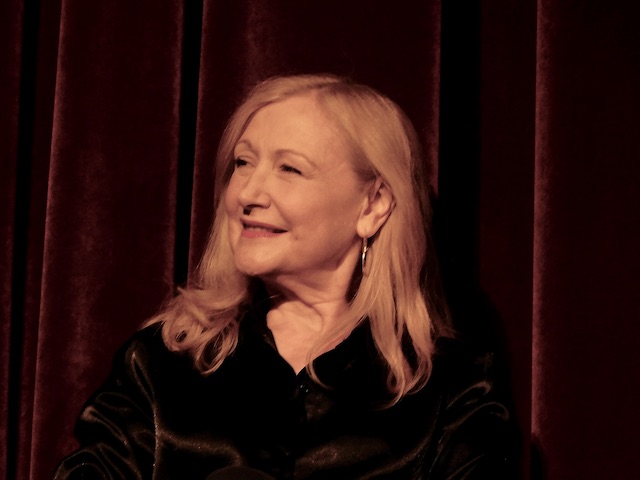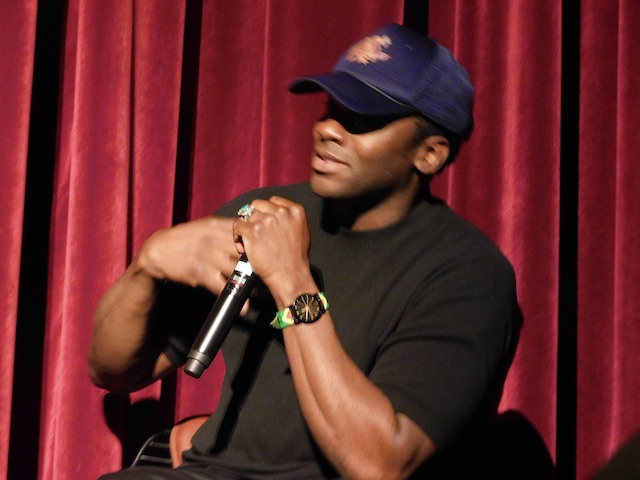
Pieces of April : Quirky and rebellious April Burns (Katie Holmes) lives with her boyfriend in a low-rent New York City apartment miles away from her emotionally distant family. But when she discovers that her mother (Patricia Clarkson) has a fatal form of breast cancer, she invites the clan to her place for Thanksgiving. While her father (Oliver Platt) struggles to drive her family into the city, April — an inexperienced cook — runs into kitchen trouble and must ask a neighbor (Sean Hayes) for help.
Director : Peter Hedge
Producer : John S. Lyons, Gary Winick, Alexis Alexanian, holly Becker
Screenwriter : Peter Hedge
Distributor : Metro-Goldwyn-Mayer
Production Co : IFC Productions, InDiGent Entertainment
Rating : PG-13 (Images of Nudity|Drug Content|Language|Sensuality)
Genre : Comedy, Drama
Original Language : English
Release Date (Theaters) : Oct 17, 2003, Wide
Release Date (Streaming): Nov 21, 2012
Box Office (Gross USA): $2.4M
Runtime : 1h 21m

© Metro-Goldwyn-Mayer Studios Inc. All Rights Reserved.
Pieces of April : Q&A with Actress Katie Holmes, Actress Patricia Clarkson, Actor Derek Luke and Director Peter Hedge moderated by Azazel Jacobs
Azazel Jacobs: What an amazing work! I was moved so deeply by this film for so many reasons. The brilliant filmmaking, the brilliant performances, the New York City of that time, the humanity, the humor, the story. There’s just so much that speaks so deeply to me.So how did this start?
Peter Hedge: First of all, thank you so much for all the films you could have picked. You picked a really good filmmaker, John Cassavetes which starts next week(lol), and you picked Pieces of April.(audience laughing) , Netflix saved this theater, and project the best films of all time.
And I want to say, as someone who saw Momma’s Man today, which is astonishing, and your other film, French Exit, which I loved, I can’t wait to see your new film. I hope everybody would see that. We are all here because of you. You never think you can get anything made, but to get to make that film the way we did, which we’ll talk about in a second, but to get to make it with these three artists(facing to Katie Holmes, Patricia Clarkson and Derek Luke), and to get to be back with them, it’s really powerful!
Basically, when I tried to speak at my mother’s funeral. I had no words. I got up, the last person to speak, I decided to say what no one else said. Everybody had said everything, I was ashamed I had nothing. At that moment, I vowed to finish writing this script. Why that’s important, when my mom got very sick I spent a lot of time, and my siblings did too, trying to find the right doctors to help her. She moved back to Iowa. One day she called and said, “what are you doing?” I said, “Mom, I’m talking to doctors.”
And she said “No, what are you making?” I said “I don’t feel like making anything. What’s the point?” She said, “Peter, there’s no point if you’re not making.” So I opened my computer file, true story, I have all these—I’m sure you have this too— all the ideas, all the things you dreamed: oh this could be something, sketch this idea 17, idea 31.
I opened a file on my computer, found this thing for notes I’d made many years earlier. It was called Pieces of April. It was inspired because I’d met this actress on the subway and I didn’t know how to ask for her phone number. It was long before I met my wife. I said I’m a playwright, and if you’re ever in anything, send me a flyer, if I can come see it.
And she did. She sent me a year later a flyer, and in this letter she said my first year in New York was really hard, and I—my friends and I—borrowed an apartment. We went to cook a turkey, and the oven didn’t work. And I went, “that was a great idea.” So I made some notes about this, I told some people about it, and they said “it’s just a sketch.”
But then, cut to many years later, I opened up this file after my mom had this hard conversation with me. And I’m reading the notes, and about the fourth page of the notes, it’s the writer’s question. Why is she cooking the turkey? Because her mother has cancer. I called my mom, and said, “Mom, you’re not going to believe this, I found this. It’s about this girl, cooking a turkey.” And mother said, “oh, that’s sounds like you when you suppose to make.” The last time my mother went out into the world, two weeks before she passed, in Iowa, she went to different shops looking for ceramic turkeys. And the ceramic turkeys in the movie are the ones she found.
I wish you’d seen the movie, but it’s not about her. She is very different from Joy. We tried three times to set it up for six million dollars and kept losing the funding. But Gary Winick(He was an American filmmaker whose films as a director include Tadpole (2002) and 13 Going on 30 (2004), the late, great Gary Winnick had started something called InDigEnt when they made ten films. Digital films with The Sony PD150, Not even high-def, it gave you a small amount of money, $100,000. We shot it in 16 days. And here we are. [Applause] They actually gave us $150,000 to shoot it, because we had so many people in it. And then they gave us $150,000 to finish.

Photo by Nobuhiro Hosoki
Azazel Jacobs: The film is so alive, it just lives and lives. And really, this is something that was a recent discovery for me. But it has that thing that the Stranger than Paradise and Breathless had, it just makes you want to make movies.
It’s this thing that goes “Oh, I want that in my life. It’s electric.” How did each of you get involved? What was the process like? What was the beginning?
Katie Holmes: I met with you(facing Peter Hedge), read it, loved it. I was lucky, I think I was one of the first to come on to it.
Peter Hedge: You are…
Katie Holmes: And I was really young and green and remember Peter said, “I promise you this is going to be one of the highlights of your career. And I was like, okay. He was so young and it’s true. He’s right, watching it tonight, I feel so grateful to be part of it. I learned so much from you—it was so special. Working with Derek was great. So much fun, and we got to work together for a minute(facing Patricia Clarkson), but it was good one!
Patricia Clarkson: I got the call, the offer to do this movie. I read it, I met with Peter and thought, “oh my God, I’m naked and dying, and he’s crying.” It was such an emotional shoot. I think as actors, what lives off stage often lives on. And so much of what we were experiencing through the day of shooting this remarkable, beautiful piece of art, we were—we had no amenities. We had no AC and nothing. We were stuck, we were changing in gas stations with no trailer. Barely had the church basement, but we had that station wagon. Finish a scene–John, our producer, we’d get a sandwich, and we’d eat in the station wagon. And we’d go out, lunch is away, and we’d start the scene again. Poor Oliver Platt, 6’10”, he stuck in this little spot, slightly chipped.
But we lived every moment of this remarkable screenplay and that’s what I was so thankful for because I think it’s what gave it its true value in life, and Peter’s emotional attachment was so real and present every day on that set. And it inspired us to bring the best of us to this. And that’s why we did it.
Derek Luke: Hi. A confession. I saw Peter outside. I hadn’t seen Peter in years. Peter, I told Katie I flew myself out here. Let me tell you why. Besides my wife, John Lyons and my agents were trying to explain to me that you need to go to New York, you need to read.
I had just done one film that hadn’t come out yet. They were going to get you out here on points. It’s weird. So now I have three boys. I have priorities. But my wife said, “It was almost like that same ticket that was sewn to you to get out, now it’s time for you to invest to get back.”
I’m here for that. It was my joy. Even though I live in the Altadena area in California, I heard you guys talking about film art and then to Katie, Patty and Oliver. Th way you guys experience. How green I was being around a pedigree that made me want to raise my pedigree. I just want to thank you guys. That’s it.
Azazel Jacobs: I’m trying to hold back because it’s such a monumental achievement. This energy was with the crew as well. I could feel them invested in being part of it finding these angles and the sound. Everything feels like it’s all working. It was I’m working for this story you wanted to tell.
Peter Hedge: Yeah, we had no time. It’s a story about running out of time. I want to hold up three people who were particularly impactful, who are no longer physically with us. Gary Winick who had this idea for InDigEnt.
He had been inspired by those Dogme 95 films. For me, Tom Sinterburg’s(producer that made “Apocalypse Now,” “The Black Stallion” and “The Talented Mt. Ripley”) celebration was like the Holy Grail of films. If I were in a position to do what you’ve done, that would be one of the films I would show. It’s just such a gorgeous film. And when we lost all our money I came back to Patty and Katie and said “How about you get paid like a hundred dollars a day? How’s that sound?” (Audience Laugh)
Patricia Clarkson: We spent that in Lunch…lol
Peter Hedge: One of the things about the way we made this is—I remember when people would say, “What’s Katie Holmes like? And I’d say, she’s a slum coach. The point is that there are people who have achieved success. Who doesn’t remember or was willing to fly coach, that capacity to say, “I’ll get on that plane.” I don’t need all of it. I just want to hold up the memory of Gary Winick and Mark Lovolsi, one of our great film editors. This was his first film on his own. He worked with everybody.
But he went on to cut The Wedding Crashers and The Devil Wears Prada and The Blind Side. Look him up. His body of work is massive. And he did such— he had such an acute sense of performance and his ability to really help me understand what was possible editorially. I saw his beauty all over the place.
And lastly, Alice Drummond, who played Dottie. And I just thought she was Just so beautiful in the film. She just lights up the screen and I miss her so much. Anyway, didn’t really have time to rewrite or rethink. Sometimes I would literally just look at the script.
Oh, we better do that. So many times in Hack, I remember shooting that scene where we pull off the side of the road. It was your Oscar clip. Why I love it is that clip cost what the craft services budget on “Cold Mountain” was for a day. Our whole show, your Oscar campaign, cost more than the movie.

Photo by Nobuhiro Hosoki
Patricia Clarkson : Cost of all my dress, my underwear, my hair, my makeup, my earrings are one day cost of Demi Moore.
Peter Hedge: That day of shooting the sun was going down—have you ever had this experience where you’re like, I have a vision for this, the director has arrived? Watch this. And I’m pitching out what it’s going to be. In four days, I don’t know, Stanley Kubrick or something. And all of a sudden, Oliver going, “Dude, can we talk? What are you doing? Cut here, just trust the scene, trust the actors, and get the f*ck out!.”
Yeah. That’s a beautiful scene. One of my favorite scenes is when Abby, as Joyce, sees the young girl in the bathroom. And that scene, it’s the only scene that was shot because the guy in the restaurant was so mad we were holding up his bathroom.
But the scene when you read was brilliant. We started to film it, and it’s hard to explain, but we were shooting in that tiny bathroom, and you hear this disembodied voice, and the door opened, and the scene didn’t work, but it wasn’t a performance. Her performance is amazing in every take. But the way the scene was structured didn’t work. I remember Tami Reiker, our DP, and Diane Dreyer, our script supervisor, and I just went, “Help! Where are we gonna?” I was shaking. “This is the scene of the movie, it’s gotta work.’
The young woman who played the girl was the daughter of a family friend, and I was like “It doesn’t work. The scene doesn’t work.” Diane said, “What if she’s wearing tights. What if her tights are down and she has to pull her tights up?” And I’m like, “I cannot go to my friend and say, ‘hey, your daughter’s tights are gonna be down.’” She said, “I think you can” And I did, and explained. I said, “this is an idea, it’ll be done tastefully.” That idea came out of trusting and going “It’s not working. We have to make it work.” I can go through every scene of the movie.
Skip needs to be on the other plane, and I can take you through each scene. This person saved me here. This was saved here. Patty did something in the performance I couldn’t have imagined. How Katie turned that into something. It’s that wonderful sense of being surprised and moved, and basically trying to keep up with these exquisite people and just make a safe enough space and hope that we’re filming as much as we can so that it will cut together and sometimes it works. And in this case it did. Sorry that was a long answer.
Azazel Jacobs: I really want to hear a scene from each of you that has a memory attached, anything that still fits to you. But I also want to mention that Sam Levy, who’s the b operator on this.
Peter Hedge: Sam? Yes. Wow.
Azazel Jacobs : It’s just like a total coincidence. Yes. I was telling him and he was like, “oh I was there.”
Peter Hedge : He was so great. Tami Reiker was our DP and Sam who’d gone on to shoot Lady Bird and Tami’s had a great career too. They’re both amazing.
Azazel Jacobs : He also said this was one of the experiences of his lifetime. Just to pass that on. But yeah, please tell me.
Peter Hedge:When you can’t pay people, they better have a good time. It’s the least I can do, true.
Peter Hedge: But yeah, please tell me. Do you have a theme that comes to mind when you were filming?
Derek Luke: You know what? I love being on that scooter . I’m serious. I’ve been trying to convince my wife to give me one, my younger brother sitting next to me. I think this was the first time I watched it with my eyes open. Being in the theater and watching people watch you was an experience for me and sometimes shaking and nerve and just trying to figure that out. But it was the first time I sat there and I just enjoyed the experience.
Man, I have so many, I think my favorite is what? Watching Pat, you’re something else. Watching you and Oliver my favorite times were in the dressing room, I told Peter Oliver getting dressed and the space is this small. And I try to give him his privacy by turning 45. And then I turn around, I see his legs, and he sees mine. What stands out is the family coming together, cohesive. My favorite was seeing you emotionally involved. You can’t manufacture that, and I haven’t had so many of those experiences since then, so thank you.
Patricia Clarkson: It’s hard for me to pick one scene in particular, because every day and it’s all kind of a blur now, the shooting, the pot scene. I’ve never smoked pot. I still have never smoked pot. But the night is young…lol
I remember I was calling him and I was like, “How am I gonna feel when I’m on pot? I gotta go shoot. How am I gonna feel on pot?” There were so many moments, I have to say to him, that last moment together, hugging you. I will never forget that as long as I live, never. [Applause]
Katie Holmes: That’s really hard to talk about. I have to say the whole experience was amazing and I do remember something funny, remember we had two turkeys?
Peter Hedge : Yes.

Photo by Nobuhiro Hosoki
Katie Holmes: They did a good job. They worked hard. I just remember I was so green and I remember that you were helpful and generous, and you taught me so much, and it was like being simple, just relax and just be simple, and I think when you’re young and don’t really know the world that you’re in, and there’s someone that says, just come here, I’ll help you.
I remember being able to recognize that, and so every scene I feel like you really helped me understand in a new way. I really appreciate that. I had so much fun with everyone. I loved watching it. I hadn’t seen it for so long. It’s so funny, same things happened, I got to enjoy it. We were all babies.
Azazel Jacobs: Thank you. I want to ask about the final scene. I think the first thing when I saw the film is I wanted to believe this happened. Tell me it did happen, that they didn’t come back.
Peter Hedge: Yeah, I think they came back. She lifted the car and pulled her child to safety in that way. Derek did that scene beautifully. This was my experience when my mom was just a little bit. My mom—alcohol walked my mom out the door when I was seven. And when I was fifteen she came out of a coma and got sober.
She spent the last twenty-two and a half years saving hundreds of people. When she got sick, what I wanted to do was to make–first of all, you want to help somebody get well. When you can’t do that, you want to make meaning. moments. Maybe selfishly for me, but also for her to make beautiful moments. And this is a movie as I listened to it tonight and I watched it. It was so just to watch it with a generous audience. I was reminded it’s a movie about trying to make a memory.
One of the gifts of the cancer death–I read this, so I wish I’d written it—is that you get this opportunity to say thank you, and I’m sorry, and goodbye. That’s what this movie is about, it’s this moment of grace they find. I tried to write scenes where they talked and processed, but it doesn’t matter what you say, she made the meal, and they showed up, and they shared that meal together. And yeah.
Azazel Jacobs : I think it happened because this is the one place where you had to have faith this was the end. You’re gathered around the table, everybody’s there, but it’s only been captured in stills. What was that sensation like for you? Did you have any idea what these frames would be like when you see the finished film?
Peter Hedge: We were driving to Krispy Kreme, which was critical. And the car broke down, so the car got towed to Krispy Kreme. It was dropped, but we lost about three hours with that. So we came racing back, and this was Katie and Derek’s first day, and Patty, and the family’s last day. We had about an hour. I’d write it. It was still images, photos, the images. Sometimes our memories are the photos we have.
Tamo Reiker said, “We can do stills, but I also want to film it. We can go back and forth with live footage.” We brought people in, and it was great. I know I said to Katie, “Say something. It’s one of my favorite moments when you whisper to Alison, touch her shoulder, and she’s so emotional you can see your handprint on her arm.”
I was just crying through the whole thing. You guys must be horrifying(facing Katie and Derek)…What I didn’t know was we cut the movie without any score. We were just going to use the “Pieces of April” song by Three Dog Night. John Lyons was like, “I said, okay I’ll score the movie if I can get my favorite musician at that moment.” He said, “Who’s that?” I said, “Stephen Merritt of The Magnetic Fields.” He didn’t know anything about Stephen Merritt. He’s a very dry genius.
Noel Coward and him would have been best friends. He comes and sees the movie. He’s a little guy with this huge voice. And he says, “I love the movie. But that song is hideous.” He wrote there are only five scored moments in the movie.
It’s about a minute and a half of score. Then there’s that last piece, which uses all the instruments he’s introduced. The ukulele, the harmonium and the percussion. He uses all those instruments. That beautiful piece when he came to perform it for me he made us stand in the hallway and he went into the women’s bathroom of this post facility.
Cleared out the bathroom and sang the song because the acoustics would be just right. And we were like, that’s a banger. Yeah, I think you just trust the humanity of the actor, I became a writer because I love actors, and wanted to be a filmmaker because I love actors. You try to create a space where they can do what they do beautifully.
I feel this in all your films, You make space for these human moments. Our job is to just be supportive and to create the space so we can capture those moments and do our best to do justice to their gifts. Yeah.
There are lots who think it’s too abrupt now. And they have their opinions. But for me it feels pretty, it feels like that’s what I was supposed to be.
Azazel Jacobs : Those people are wrong,
Peter Hodge : I’m gonna carry it for the rest of my life.
Azazel Jacobs : I do want to say for those of us who have been in this process of losing people, this is an extremely helpful film, and I’m so grateful. I’m grateful to Derek Luke, Patricia Clarkson, Katie Holmes, and Peter Hedge, thank you so much for being here.

Photo by Nobuhiro Hosoki
If you like the article, share your thoughts below!
Check out more of Nobuhiro’s articles.
Here’s the trailer of the film.

